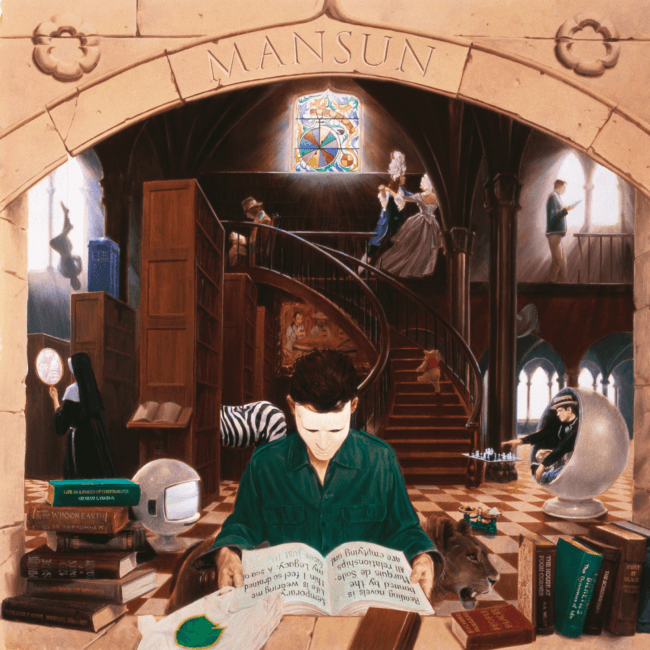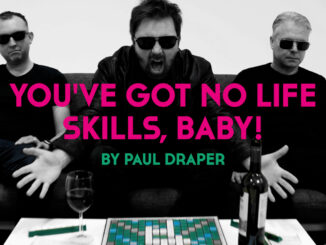
The last few years have seen many classic records of the ’90s celebrate their 20 year anniversaries. One of these was the second Mansun album ‘Six’, originally issued back in September 1998, and reissued this week in an exemplary new edition of the LP, available in a variety of formats.
The brilliant Chester-based four-piece were a world apart from the other guitar groups of the ’90s. Despite being unusual, darkly humorous and distinctly non-Britpop, their excellent debut LP ‘Attack Of The Grey Lantern’ hit the top of the charts in 1997, a golden year for music. An odd mixture of absurd lyrics, exciting melodies, string sections, singalong choruses and drum loops, it quickly converted me into a fan the first time I heard it. The 1998 follow up ‘Six’ was a hugely ambitious thing for a mainstream group to release in the late ’90s, a fascinating piece of work that had absolutely nothing in common with the musical landscape of the time. In fact, it’s very much a record that stands on its own, like nothing ever made or ever heard before in any musical era. It confused and bewildered many, as well as putting their chances of being the next biggest mainstream phenomenon back a few steps. But artistically it may have been the greatest achievement of the late ’90s.
When the release of their second album was announced in 1998, fans were excited and curious to know what direction the band would take next. We expected more songs with ridiculously funny lyrics and even catchier choruses, or a set of sombre epics like the non-album single ‘Closed For Business’. Instead, we got ‘Six’. But first came the marvellous ‘Legacy’, anthemic certainly, but in retrospect a haunting and poignant insight into the mind of an evidently troubled songwriter, and indeed frontman Paul Draper was now writing from a brutally personal angle.
A lot of us had our hopes pinned on Mansun to deliver something massive that would reinvigorate the indie scene and take them to the top. It was a good sign that they announced the release of their second album just one year after their first. Maybe they were coming up with so many incredible songs that they couldn’t wait any longer to unleash them on the world. So when they released ‘Legacy’, it certainly wasn’t the sort of triumphant, humorous, character-based freak anthem that many of us expected. At first, it sounded more like the sort of thing they would’ve left as an album track. But repeated listens to Legacy revealed a depth unlike any of their previous work. It also features some of the greatest chord changes: That killer moment as they hit the line “I wouldn’t care if I was washed up tomorrow”, and the unexpected brightening at the end of the chorus. Dominic Chad’s guitar evoking echoes in the cosmos and Draper’s vocal hitting spectacularly emotional highs, enhancing the slow building beauty of its melody.
It may be one of the bleakest Top 10 hits of all time. According to the lyrics, no matter what you do with your life or how much money you make, you end up in the same place as everyone else, and when you’re dead, nobody gives a shit. How very cheerful. Yet this actually turned out to the most accessible track from ‘Six’, which wasn’t exactly packed with potential hit singles. What else were they supposed to choose from? Let’s face it, they were never going to make Top Of The Pops with the lyric “I’m emotionally raped by Jesus” or three minutes of Doctor Who icon Tom Baker narrating over harpsichord and opera…
It’s fair to say that there was always darkness at the heart of Mansun: they were, after all, named after a notorious serial killer. But not only does this song concern death, it even makes life itself sound futile and worthless as you spend it having to “prove your worth to people that you call your friends”. Even the greatest joy in the world is dampened with the recurring line “all relationships are emptying and temporary”. It struck me just how downbeat this sounded for a band who had just hit the big time. Despite the success and growing fame, this song was not the work of a healthy, happy mind.
I remember thinking that ‘Legacy’ was an odd choice for a comeback single at first. But I just assumed that there were more instant and catchy songs to come on the album. Then I heard the album. I can’t think of any other band or artist who followed a number 1 LP with such a challenging record. It’s almost like Paul Draper’s creativity and talent naturally developed at a much faster rate than all other musicians. Way ahead of usual standards, I also cannot think of any other band or artist who managed a debut full-length as accomplished and eclectic as ‘Attack Of The Grey Lantern’. And most bands don’t make their experimental odyssey until far into their careers. Mansun did it on their second album. ‘Legacy’ made a bit more sense when heard in the context of ‘Six’: the natural choice of a lead single that would act as a bridge between the darkly melodic yet strangely familiar Mansun of ‘Attack Of The Grey Lantern’ and the weird puzzle that was their second LP.
Even though Arthur Baker’s single edit of the opening title track has a fine meaty sound, you can’t help but feel that it’s missing something. That something is the utter insanity that unfolds throughout the unedited version of ‘Six’ that provides its parent album with a most awe-inspiring introduction. After transforming through a series of different segments, it eventually reverts back to the initial verse at around the seven-minute mark, with Paul Draper’s reprised vocal line being fed through a variety of mad effects. Following this demented opus, we get the utterly insane ‘Shotgun’ and the surging self-loathing of ‘Negative’. Out of all the tracks from the LP, ‘Negative’ is the one that immediately stands out in terms of brilliant guitar work, as Dominic Chad’s sky high notes and spiralling riffs add to a stubborn tantrum of a rhythm, while Draper’s dynamic vocals increase the song’s darkly rousing power.
The brief piano-led ‘Inverse Midas’ is grand yet understated, leading into the jerky ‘Anti-Everything’, before the arrival of the schizophrenic ‘Fall Out’, which pastes ‘Dance Of The Sugar Plum Fairy’-sampling electronics with a ‘Hunky Dory’-era Bowie rock out. By this point in the album, you feel like anything could happen. You’d be right. ‘Serotonin’ is a stubborn, sulky track with a fantastic drum sound, mainly down to Andie Rathbone but also a result of Mark ‘Spike’ Stent’s fine production work. The bizarre, Tom Baker-assisted operatic centrepiece ‘Witness To A Murder Part 2’ has to be heard to be believed. To call it extraordinary is probably an understatement. This is in fact totally nuts. It didn’t make sense then, it doesn’t make sense 21 years later, and it won’t ever make sense. And that’s exactly the way it should be.
‘Television’ bursts with paranoia, ‘Special/Blown It (Delete As Appropriate)’ provides a brilliant tale of misery and failure, and ‘Legacy’ makes more of an impact as part of this record than by itself. ‘Being A Girl’ was an amazing bit of post-punk, but back then seemed like an odd choice for a single. The single version of the track is a brief 2-minute excerpt which makes up the first part of the epic, eight-minute album version, which lifts off into astonishing space rock territory instead of finishing abruptly as the single version does. What the song also gives us is a brilliantly self-deprecating view of male insecurity driven by social pressures, and the mask of masculinity, as well as some fearsome drumming from the band’s engine room, Rathbone. Kicking off with some nice hi-hat action, it’s all about the snares in the second half of each verse, before the whole kit gets a thrashing during that explosive, angsty chorus. ‘Being a Girl’ was an allegory for not being happy in the situation I was in, and wanting something different” said frontman Paul Draper. “It was the last thing written, recorded and mixed during the sessions”. Interestingly and rather hilariously, the ever-so-slightly homo-erotic video features none other than a young Danny Dyer, in his first major acting role.
With lyrical passages referencing failure, self-destruction, Taoism, Winnie The Pooh, ‘The Prisoner’ and the death of Brian Jones, there wasn’t a jovial ‘Stripper Vicar’ singalong anywhere in sight. It was like having a handful of songs divided up by lots of segueing movements rather than an album full of potential hits. I can only begin to imagine what the people at their label thought of it. It was and still is hard to believe that a commercially successful band had followed up a number one debut album with this sprawling jigsaw of insane ideas and uncompromising, multi-directional song fragments. It’s a post-punk prog masterpiece that didn’t make any sense in the indie rock scene of 1998 because it wasn’t meant to. Railing against the musical complacency of the surrounding mainstream climate, one of the reasons ‘Six’ appeal hasn’t worn off is because it doesn’t sound dated. You can’t put a date on the genuinely one-off sound and style of ‘Six’. Although it has influenced a number of people, nothing quite like it has been made since. It isn’t relevant to 1998, and neither is it relevant to any other year before or after it. It is a remarkable, incomparable and timeless musical oddity.
‘Six’ arrived in September 1998, aptly making number 6 in the album charts. Although it baffled critics and fans upon its release, it has gone on to be a cult classic. But to listeners with “normal” tastes in music, it was certainly not going to be as accessible as their chart-topping debut. Maybe it had something to do with the fact that whenever Draper would write anything resembling a conventional song that could’ve been a hit, he’d shove it to the side to use as a B side instead. Mansun were famous for this, hence their reputation for creating some of the best EPs of the decade.
Releasing their singles across a variety of formats meant that fans were in for extra treats every time the band would bring out a new song. The second disc of the CD/DVD reissue is made up of these, and in itself is an amazing listening experience. The filthy bass and post-punk atmospherics of ‘What It’s Like To Be Hated’ are particularly excellent, and even the punky throwaway ‘G.S.O.H’ is essential for providing balance and a bit of much-needed light relief. As with the parent album, each track has a unique drum sound, highlighting the superb production work of Draper and Mark ‘Spike’ Stent. Addressing the experiences of deja-vu, the superb ‘Been Here Before’ is another Mansun B side that could’ve easily been another hit single, enticing with its winding passages and gritty chorus. There’s the introspective atmospheres of the shadowy ‘When The Wind Blows’, where a haunting melody, stark piano notes and more sublime guitar sounds deliver something with more hit potential than anything on ‘Six’.
‘Can’t Afford to Die’ is immediately striking, travelling urgently down winding pathways and diving into a paranoid headrush of a chorus. Not just a surprisingly great B side, but stronger than the material that many bands and artists were releasing as singles. Following the intriguing ‘Church Of the Drive Thru Elvis’, we find ‘I Care’, a song which provides one of those “did he just say what I thought he said?” moments with the unexpected lyric “I want to get fucked like a whore in a porno”. On ‘King Of Beauty’, opening acoustic chords and bleak melancholy make way for the dirty riffage and sneering attitude of its chorus. There are some interesting electronics 3 minutes in, and according to Draper, “This song is about someone in a band… but not myself.”
‘But The Trains Run On Time’ adds more weight to the collection, while ‘Check Under The Bed’ finds a delicate and pretty verse making way for another intense, surging chorus, again demonstrating the versatility and dynamics of the group as both musicians and a formidable artistic force. Then there’s the fantastic ‘I Deserve What I Get’, a solemn, darkly alluring helping of cold, creeping funk. It’s very much like how the third Mansun album ‘Little Kix’ could have been without record label interference. I’d argue that it’s ahead of its time compared to the sounds other indie guitar groups were producing at the time. The disc of B sides is rounded off with the spectacular fan favourite ‘Railings’, a haunting, intense track written for the band by Magazine and Buzzcocks legend Howard Devoto, who duets on the track with Draper. But it’s not quite finished, there: there’s a superb hidden track at the end. With a very tasty drum sound and lots of fun being had with guitar pedals, the oddly infectious ‘Spasm Of Identity’ adds a spiky chanted lyric to deepened Bowie-like backing vocals. With songs like these, it’s clear to see why Mansun fans still regard the group’s B sides to be better than the tracks that most bands were releasing as singles.
The third disc will no doubt thrill longterm fans of the group and features previously unheard outtakes and alternative versions of songs from the ‘Six’ sessions. Opening with three minutes of someone recording different takes of a monologue would usually be a bad move. Not when that someone is Tom Baker. Even the method of his breathing between the words is a fascinating thing to hear and study. Unreleased songs make you wonder why they’ve been locked away in the vaults for so many years: the original version of ‘King Of Beauty’ by Dominic Chad is wonderful, and ‘There’s No Taste Like Heinz’ is a fine bit of instrumental post-punk with shredding guitars and drums that sound like metal oil barrels. Elsewhere, the fantastic ‘8 Bit Drum Kit’ brings to mind The Police and Magazine forming a supergroup, ‘Uncle Peter’ is utterly surreal, and ‘Peterodactyl’ is a prototype of ‘Serotonin’ plastered in distorted mutterings. Believe it or not, Six could have actually been even crazier than the final product. Fascinating stuff.
But much of the rarities disc shows that aside from a glorious full-length ‘Inverse Midas’ (working title ‘Bobblehat’) and two crushing takes of ‘Cancer’, the band did make the right choices with their final selections, and the finished edits of the tracks that ended up as pieces of ‘Six’. The longer version of ‘Fall Out’ loses some impact, while the alternative take of ‘Legacy’ is a pointless addition, and although the other version of ‘When The Wind Blows’ is wonderful, the finished product is even better. The 3rd disc also makes room for two other magnificent B sides not featured on the 2nd CD,one being the riff-heavy ‘Hideout’, lyrically influenced by time spent in the band’s Chester base “The Grey House”, and featuring a beefy electronic loop not unlike the one that provided the climax to the classic ‘Taxloss’ from 1997. The other is the atmospheric post-punk trip-hop instrumental ‘Face In The Crowd’, a soaring, futuristic piece of music that would’ve made a fine album opener.
It’s impossible to take in, absorb and understand such deeply revealing music on the first listen, which is why I wondered what the fuck Mansun were playing at when they released ‘Six’. They must have known those songs were too bizarre and out of step to continue their mainstream ascendancy. After a short while, I realised that perhaps staying true to their artistic instincts was far more important to this band than fitting in and running on the commercial treadmill. Years later, many albums from 1998 aren’t really played in my house, even the very best ones. Why? Because even though they’re great, I’ve heard them all too many times for them to reveal anything new. Whereas ‘Six’ still fascinates and intrigues my senses 21 years on, while my ears still manage to find new things to focus on every time I hear the LP.
One of the greatest albums of the era? I’d answer that with a certain and resounding “yes”.





Be the first to comment